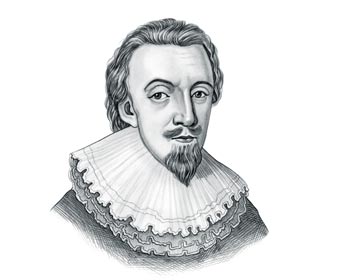He was conferred the title of Baron of Baltimore and sponsored a small colony at Ferryland in his Province of Avalon in Newfoundland. King Charles I agreed to his petition for a colonial grant but Calvert died before the charter for Maryland was officially granted on June 20, 1632.
Facts about George Calvert, Lord Baltimore
The following facts about George Calvert, Lord Baltimore, provide interesting facts and an overview and description of the life and times and his involvement in the early colonization of America and the Maryland Colony.
Fact 1: George Calvert, Lord Baltimore, was famous as the founder of the Maryland Colony and his efforts to create a refuge in America for English Catholics
Fact 2: When was George Calvert born? He was born in 1579
Fact 3: Where was George Calvert born? He was born in Catterick, North Yorkshire, England
Fact 4: The parents of George Calvert were Leonard and Alicia Calvert. His father was a member of the landed gentry and owned a small estate in Kiplin, Catterick, North Yorkshire where George was born and raised as a Protestant
Fact 5: George Calvert received an excellent education and attended Trinity College, Oxford, had a gift for languages and went on to study law.
Fact 6:
In 1603 he undertook work for Sir Robert Cecil, the chief minister of Queen Elizabeth I, that required travel to Europe and became recognised at court as a specialist in foreign affairs
Fact 7: In November 1604, he married Anne Mayne in a Protestant ceremony at St Peterís, Cornhill in London
Fact 8: In 1610 and 1611, George Calvert undertook missions to Europe on behalf of King James I of England
Fact 9: In 1613, King James I commissioned Calvert to investigate Catholic grievances in Ireland
Fact 10: George Calvert was knighted in 1617 for his services to the king
Fact 11: He became a member of the English Parliament in 1621 and served as Secretary of State and Privy Counselor to King James I
Fact 12: In 1620 he sponsored a small colony at Ferryland in his Province of Avalon, Newfoundland
Fact 13: In February 1624 George Calvert resigned his political post and let it be publicly known that he had converted to Catholicism
Fact 14: In 1625 George Calvert was conferred with the title of Baron of Baltimore and became known as Lord Baltimore
Fact 15: George Calvert, Lord Baltimore visited his American lands with his son in 1627 and 1629 but, concerned about the ability to live in such a harsh climate, he decided to try to obtain lands in a warmer climate. He aspired to create a refuge in North America for English Catholics.
Fact 16: King Charles I agreed to his petition for a large colonial grant and granted lands located north of the Potomac River on either side of the Chesapeake Bay
Fact 17: In 1632 Lord Baltimore, suffering ill health, sent his son Leonard Calvert, together with 300 Catholic settlers back to America.
Fact 18: Lord Baltimore died in his lodgings at Lincoln's Inn Fields, London on 15 April 1632
Fact 19: The charter for Maryland was officially granted five weeks after his death on June 20, 1632
Fact 20: Maryland became a refuge for Catholic settlers, as George Calvert had hoped and thousands of British Catholics emigrated to Maryland.
